21 Apr 17 | Event Reports, News and features, Turkey
[vc_row][vc_column][vc_column_text]
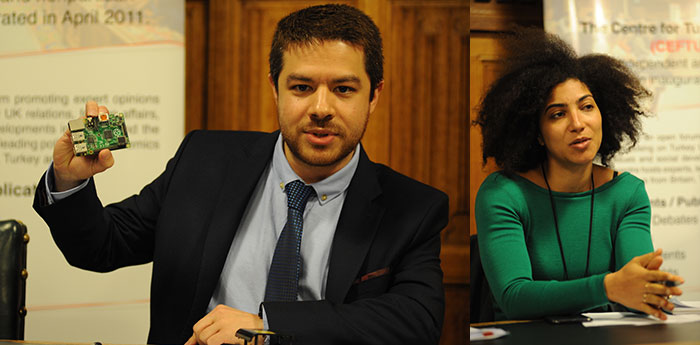
Alp Toker of the 2017 Freedom of Expression Digital Activism Award-winning Turkey Blocks and Index on Censorship head of advocacy, Melody Patry. (Photo: Centre for Turkey Studies)
The Centre for Turkey Studies (CEFTUS) and Index on Censorship held a public forum at the House of Commons on Thursday 20 April 2017 to discuss the impact of the recent Turkish referendum as part of the 2017 Freedom of Expression Awards.
The referendum held on 16 April 2017 saw President Recep Tayyip Erdogan secure 51.3% of the vote to obtain sweeping presidential powers.
Chaired by former PEN International director Sara Whyatt, the debate focused on Turkey’s domestic and foreign policies and what the outcome of the referendum now means for freedom of expression in the European nation. The panel included Guney Yildiz, special adviser to the Foreign Affairs Select Committee, Alp Toker, founder of internet shutdown monitoring organisation Turkey Blocks, winner of the 2017 Freedom of Expression Digital Activism Award, and Index on Censorship’s head of advocacy, Melody Patry.
In his presentation, Yildiz took a broad stance in his observations on the referendum outcome.
The special adviser opposed the view that Turkey’s referendum primarily concerned Erdogan and his drive for increased powers. He claimed that “the movement towards a presidential system was already underway even before the referendum”.
“Something even more important is going on in Turkey, it’s a massive restructuring of the state and it goes beyond Erdogan,” the select committee adviser said.
Yildiz also argued that it was wrong for Turkey to be described as a “polarised society”, or to deem President Erdogan a “polarising figure” following the referendum results. He described Turkey as a “multi-polar country” with a “fragmented opposition” who were already divided among themselves over a host of other issues, divisions which they were unlikely to overcome.
“The proposition that this referendum is the beginning of the end of President Erdogan, in my opinion, is mistaken,” Yildiz said.
Yildiz went on to discuss the impact of the referendum on the Kurdish population, foreign policy and the future of Turkey.
The special adviser concluded: “Winning the presidency is a huge step, but it doesn’t mean that Erdogan is in any lack of challenges. I would say that these challenges are coming mostly from regional tensions, the Turkish economy and other structural changes rather than the Turkish opposition.”
Index’s head of advocacy Melody Patry spoke on the implications of the Turkish referendum on freedom of expression.
Patry explained that before the coup attempt in July 2016, Turkey was “not quite what we’d call a safe haven for free speech”. However, the onset of the coup accelerated the pace and widened the scope of the crackdown on both media freedom and freedom of expression more generally, with the government resorting to methods of intimidation. “We are now talking about not just thousands, but tens of thousands of academics, journalists, students having lost their jobs or being fired or detained,” Patry expressed.
Index’s head of advocacy also highlighted that, since July of this year, 150 journalists have been jailed and 159 media outlets closed in Turkey. These are only the cases that have been recorded due to the difficulties surrounding the monitoring of attacks on the press. “Because it is difficult to monitor, it is also difficult to hold Turkish government to account.”
Before the coup attempt, many journalists were arrested for crimes relating to defamation and terrorism. “These kinds of charges are all the more concerning at a time when after the referendum, Erdogan is talking about reestablishing the death penalty,” said Patry. “We know that being associated with terror and terrorism could potentially put a target on the back or the forehead for the death penalty.”
In presenting his views on the referendum, Turkish-British technologist Alp Toker began by looking at the positives arising from the election. “A huge turnout means huge engagement; people are interested in voting, they are engaged with the political process,” he said.
In contrast to the stance adopted by Yildiz, Toker felt that Turkey had indeed become more polarised. However, the technologist made it clear that this was not a conclusion that should be reached through opinion, but through independent observation — something which Turkey currently lacked. “We’re missing out on something which you might call truth,” he said.
When turning to the work of his organisation Turkey Blocks, which was used to monitor the internet during the election weekend, Toker confirmed that no incidents of mass scale internet shutdowns were identified. This, however, did not equate to the “all clear” for media freedom and security in Turkey. “In fact, some could interpret it as the opposite,” the technologist said. “One of the opinions I heard is that they [Turkish government] don’t feel the need to control the internet because it has other means of controlling opinions.”
In drawing to a close, Toker argued that a better understanding of what kind of freedom was expected in Turkey needed to be established before progress could be made. The technologist said that this was “not a problem to be fixed from the outside” and that a “multi-pronged approach” would need to be adopted in order to solve it. “It’s not going to help if we continue this post-election polarisation,” he concluded. [/vc_column_text][vc_video link=”https://www.youtube.com/watch?v=obmYZsDBu6s”][/vc_column][/vc_row]
21 Apr 17 | Asia and Pacific, Digital Freedom, Europe and Central Asia, Event Reports, Maldives, News and features, Serbia
[vc_row][vc_column][vc_column_text]
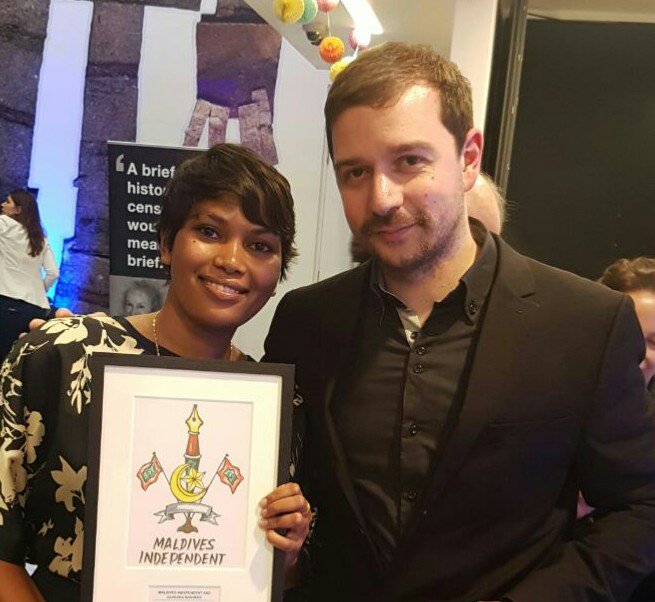
Maldives Independent’s former editor Zaheena Rasheed and KRIK editor-in-chief Stevan Dojcinovic. (Photo: KRIK)
Thousands of miles separate the Maldives from Serbia, but Zaheena Rasheed, the Index award-winning journalist and former editor of Maldives Independent, and Stevan Dojcinovic, editor-in-chief of the Serbian investigative website KRIK, but both described similar attacks on press freedom at a panel discussion at the Corinthia Hotel in London.
Rasheed lives in exile, having been forced to flee the Indian Ocean archipelago after working on an Al Jazeera documentary critical of the Maldivian government. She said she escaped just in time – a man who left a day later “barely made it out of the airport”.
Rasheed spoke of the intimidation tactics that independent news media had been subject to in the country. “Some newsrooms had gangs going inside of the newsroom and saying specifically we are not leaving until certain articles were taken down,” she said.
The Maldivian government claims that these gangs are criminals beyond their control.
As violence does not deter outlets like Maldives Independent from their investigative work, president Abdulla Yameen’s regime resorted to legal means, including imposing a draconian defamation law.
Rasheed said: “The definition of defamation is so broad that I could be sued for something I think, it doesn’t have to even be expressed. It could be a gesture. If it’s a gang or criminals after you, you can hide and avoid it, but when it’s the government you just can’t.”
On Serbia, Dojcinovic said that most in the West do not realise the extent of the country’s problems. “There’s not a real, clear picture of Serbia in the EU regarding how wild corruption and crime are,” he said.
Both journalists have seen hard-won democratic freedoms erode quickly. In Serbia this slide began in 2012 when Aleksandar Vučić was elected prime minister (this month, Vučić was also elected as the country’s president). Dojcinovic said: “The government has managed to destroy and undermine all of the democratic institutions built over 12 years within two years. We no longer have an independent judicial system and it’s the same with the media.”
In the Maldives, 2012 also left its mark. “Since the coup, a lot of democratic gains have been lost. What we saw in the first couple of years after the coup were physical assaults against journalists,” Rasheed said. “There were murder attempts, death threats and one TV station was even torched.”
She said that police turned a blind eye to these attacks. “All of the CCTV cameras were turned away from the building. The police just weren’t there.”
Whilst the threats are different in Serbia, Dojcinovic described a choked media landscape: “It’s not possible to see criticism of the government in the mainstream media. Not on any newsstand or on any TV frequency. They have destroyed all of these institutions.”
Dojcinovic said that the Serbian government is falling into the same patterns as Slobodan Milosevic’s regime: “It’s the arrests of journalists by the same group of people who were behind the murder of journalists back in the 1990s. They can’t cross this line now because it would ruin their reputation with the EU, so they find a way to make your life a nightmare without leaving fingerprints.”
Reprisals for his work have included three smear campaigns: he has been tagged as a criminal for his links to organised crime, branded a foreign agent, and had his personal life put on display.
“You cannot fight this much either because you can only publish on the internet,” Dojcinovic said. “That’s nothing compared to the newspapers which present us in this way.”
In the Maldives, however, there appears to be no such line. Rasheed said: “A member of our team was disappeared in 2014. Then a well-known gangster, who we think was involved in our colleague’s disappearance, vandalised the security cameras [at our office] and left a machete at our door. And then I got a text message saying: ‘You’re next.’”
Rasheed thinks that her colleague Ahmed Rilwan was targeted because he was seen to be in favour of secularism, and negative stories about Islamic radicalisation raise the government’s ire. “What really bothers them are these stories of growing radicalisation in the Maldives because that is what puts tourists off,” she said.
Rasheed also spoke about the difficulties of constantly fighting such repression. She told the audience that she had, to some extent, been traumatised by her experiences. However: “As a journalist, the most important thing to do is to live to tell the story.”[/vc_column_text][/vc_column][/vc_row][vc_row][vc_column][vc_basic_grid post_type=”post” max_items=”4″ element_width=”6″ grid_id=”vc_gid:1492769899588-d49a7ccf-cd47-5″ taxonomies=”8148, 9028, 8734″][/vc_column][/vc_row]
21 Apr 17 | Index in the Press
В пятницу стало известно о том, что оппозиционный активист Ильдар Дадин обратился в Железнодорожный городской суд Московской области с иском, в котором требует взыскать с России компенсацию в 5 млн рублей за незаконное уголовное преследование. Read the full article
21 Apr 17 | News and features, Turkey, Turkey Uncensored
[vc_row][vc_column][vc_column_text]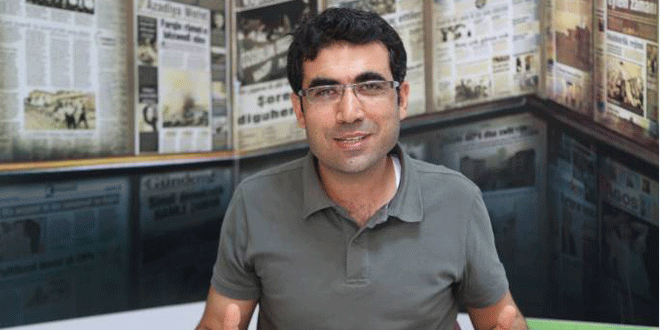
“Of course my family are worried. Who in this country isn’t worried?” says Ramazan Ölçen, who was detained for owning the copyrights to Azadiya Welat (Freedom of the country), what was Turkey’s only Kurdish-language daily newspaper. It was shut down by a cabinet decree issued under Turkey’s state of emergency, which has been in place since 20 July 2016.
“On 4 March 2017, at around 6am, special operations officers and counterterrorism police raided my house [in Diyarbakır], which was completely unnecessary,” he says. “I would have voluntarily gone and testified if the prosecutor’s office had sent me a notice.”
Ölçen’s wife was terrified by the “special operations officers wearing masks on their faces and sporting automatic rifles” he says. “Honestly, I too was afraid.”
The couple’s one-year-old was spared that fear as he was asleep throughout. “He didn’t wake up to all that noise,” Ölçen says.
The officers searched the house for about an hour but found no evidence of a crime. They seized Ölçen’s mobile phone and he was taken into custody. He was held for two days and released on 6 March, but his family are still deeply worried.
“Detention was a situation we did anticipate, yet we were still surprised [by the raid],” he says.“We were expecting it because they were rounding up everyone whose name appeared in the mastheads of the press organisations that were shut down under Cabinet decrees to testify.”
From teaching French to Azadiya Welat
Ölçen was born in 1981 in the Silvan district of Diyarbakır. He graduated in French from Dicle University in 2003. For three years, he taught French at various schools as a contract teacher. “In 2006 I gave up teaching and chose not to renew my contract. Of course, school principals who didn’t deem contract teachers as teachers played a role in my decision. As did local education directors, ministry bureaucrats, education ministers and the government’s overall education policies.”
In 2008 Ölçen started working as a journalist at Azadiya Welat. He assumed many roles until the newspaper’s closure, from news editor and editor of culture and arts to editor of the language and literature pages.
In 2014 the formal owner of Azadiya Welat parted ways with the newspaper. Ölçen assumed the responsibility and became the formal owner of the copyrights of Zozan Publishing, the publishing group under which Azadiya Welat was published. “As such, my name formally entered the masthead of the newspaper of Apê Musa,” Ölçen said, referring to Musa Anter, a Kurdish dissident intellectual and writer, who was assassinated in 1992, often referred to as “apê” (uncle), a word of both affection and esteem.
“This was a source of immense pride for me and until the day it was shut down with a cabinet decree I tried my best to be worthy of the tradition of Apê Musa in terms of serving the Kurdish language.”
At Azadiya Welat, the day started with the editorial morning meeting. In addition to journalism and editing, Ölçen was in charge of administrative affairs. They worked hard to meet the printing deadlines.
On 28 August 2016 the police raided the newspaper’s head office in Diyarbakır, detaining 25 of its employees. The newspaper was then only “temporarily” shut down. A new decree shuttered it permanently in October of the same year.
A troubled history
When the newspaper was closed, Ölçen started working as a freelance journalist, as did around 3,500 other former employees.
Recently, Ölçen started working as an editor for the Kurdish language newspaper Rojeva Medya, which started publishing after Azadiya Welat’s closure. Rojeva is not a direct successor, Ölçen says, most of its employees are former Azadiya Welat journalists, and the two have very similar editorial policies.
Azadiya Welat, which had been in print for 21 years, was no stranger to suppression. As a Kurdish outlet, even before the state of emergency, it was constantly harassed by authorities, its journalists routinely imprisoned and tried. It was shut down and reopened countless times. Currently, ten of its journalists and distributors are in prison, most of them serving convictions issues before the coup attempt.
Many of its journalists have been in and out of jail since that first raid in August 2016, but the price the newspaper has paid in its nearly a quarter of a century history has been much higher than that.
In 2010, Metin Alataş, an Azadiya Welat distributor, was found hanging dead from an orange tree in Adana. In 2014, Kadri Bağdu, a distributor for Azadiya Welat was murdered in an armed attack.
More recently, Azadiya Welat journalist Rohat Aktaş was killed during a curfew in the southeastern town of Cizre while he was reporting on the security forces’ operations in the area. Aktaş was allegedly killed along with many other civilians who were hiding in a residential basement where they had taken refuge from the shelling in February 2016. But the authorities wouldn’t leave him alone after his death. On 7 March the Diyarbakır Prosecutor’s Office launched criminal proceedings against Aktaş. The prosecutor asked for up to seven years on terrorism-related charges for the slain journalist.
Not surprisingly, Kurds have had more than their fair share of difficulties since Turkey’s 15 July coup attempt. Many pro-Kurdish outlets have been shut down under Turkey’s state of emergency, which was itself extended this week for another three months. The ban on the Kurdish language seems to be making a de-facto comeback. With Turkey’s 16 April referendum expected to turn the country even more authoritarian, the prospects for any minority outlets being able to thrive seems slim. Will things ever improve for the country’s Kurdish media?
Ölçen is not entirely optimistic. “However, I am not completely hopeless either. There have always been pressures and there always will be. But there has also always been resistance against pressure, and those will also always be.”[/vc_column_text][vc_column_text]

Turkey Uncensored is an Index on Censorship project to publish a series of articles from censored Turkish writers, artists and translators.
[/vc_column_text][/vc_column][/vc_row][vc_row][vc_column][vc_basic_grid post_type=”post” max_items=”4″ element_width=”6″ grid_id=”vc_gid:1493282486109-b08bdef5-201d-8″ taxonomies=”8607″][/vc_column][/vc_row]
21 Apr 17 | Index in the Press
Index on Censorship, a group that campaigns for free expression globally, announced the 2017 winners of its freedom of expression awards in London on Wednesday. The four winners were drawn from more than 400 nominations. Read the full article
20 Apr 17 | Bahrain, Bahrain Statements, Campaigns, Campaigns -- Featured, Middle East and North Africa, Statements
[vc_row][vc_column][vc_column_text]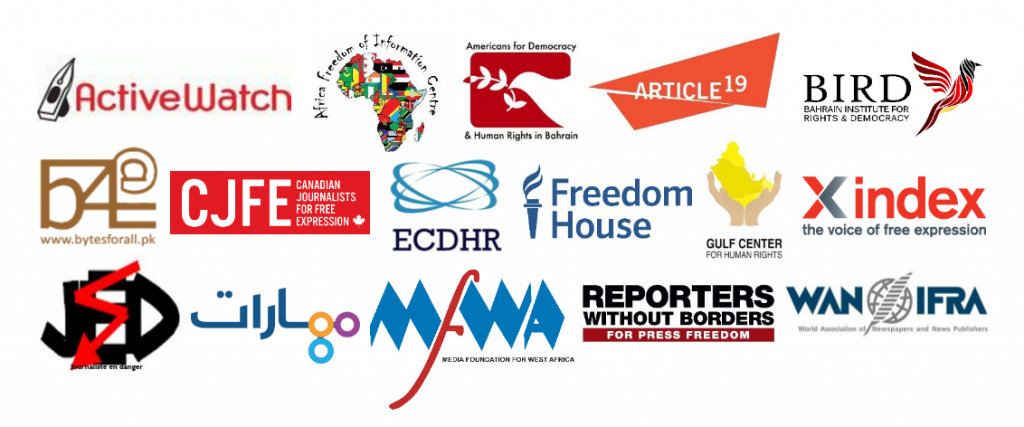
To: Sheikh Hamad bin Isa Al Khalifa
King of Bahrain
CC: Hon. Zeid Ra’ad Zeid al-Hussein
High Commissioner for Human Rights
Ms. Frederica Mogherini
High Representative of the European Union for Foreign Affairs and Security Policy
Mr. Sigmar Gabriel
Vice-Chancellor and Foreign Minister of the Federal Republic of Germany
Mr. Rex W. Tillerson
United States Secretary of State
The Right Honorable Boris Johnson
Foreign & Commonwealth Office of the United Kingdom
Mr. Jean-Marc Ayrault
Minister of Foreign Affairs of France
King Hamad,
We, the undersigned, express our deep concern with the government of Bahrain’s continued targeting of journalists, which further restricts free press and expression in the country. On 23 April 2017, the court of appeals will hold another hearing for Sayed Ahmed Salman al-Mousawi, an internationally-renowned photographer, after he was arrested more than three years ago for alleged terrorist activities. The government’s repeated harassment of al-Mousawi and other journalists highlight the ongoing censorship and restrictions on free press and expression in Bahrain.
Sayed Ahmed Salman al-Mousawi is a 29-year-old freelance photographer who has won 169 international photography prizes—a number of which he even won while in detention. He is a member of FIAP, PSA, UPI and Qatif photos.
Authorities arrested al-Mousawi, along with his brother Sayed Mohammed, on 10 February 2014 from their home in Duraz. The plain-clothes masked policemen did not present any arrest warrant and confiscated his cameras and electronic devices. After holding al-Mousawi for six days, officials transferred him to Dry Dock prison. Security forces then took him to the Criminal Investigations Directorate (CID) for another six days where they tortured him “cruelly without mercy,” as he later told his father. Security officers hung him on a door four times, electrocuted him, and did not allow him to sit for four days. They stripped him naked, beat him and sexually assaulted him. No independent investigation into his torture allegations has ever been conducted.
Al-Mousawi spent over nine months in detention without official charges against him. At his first trial on 24 December 2014, the prosecutor charged him with forming and participating in a terror cell, accusing him of providing SIM cards to protesters —“terrorists”—and taking photos of anti-government demonstrations. He and other witnesses denied that he had anything to do with the riots. Over the course of 2015, officials postponed his trial six times. Meanwhile, the government continued to deny him his basic human rights, including restricting access to a lawyer, placing him in solitary confinement, and denying family visits.
On 23 November 2015, the Bahraini court sentenced al-Mousawi to 10 years imprisonment and revoked his citizenship. However, the Court of Cassation overturned the ruling earlier this year. His postponed appeal hearing next month provides an opportunity to end his prolonged arbitrary detention and mistreatment. Al-Mousawi has now been held arbitrarily for over three years, merely for exercising his right to free expression.
Al-Mousawi’s case is representative of the Bahraini government’s growing repression against basic civil rights. We, the undersigned, have raised our concern over numerous cases of torture, arbitrary detention, unfair trials, and trumped up terrorism charges used to restrict expression unfavourable to the government. Journalists, bloggers, online activists and human rights defenders such as Faisal Hayyat, Nazeeha Saeed, and Nabeel Rajab, among others, have increasingly come under attack by authorities since the 2011 pro-democracy protests. Arbitrary arrests of journalists, systematic torture and impunity have turned Bahrain into a dangerous country for those who speak out. The country is ranked 162nd out of 180 countries in Reporters Without Borders’ (RSF) 2016 World Press Freedom Index and has become one of the biggest detainers for journalists and bloggers with at least 14 behind bars as of today.
Furthermore, the government has also censored and restricted the media, most recently in January, temporarily suspending the online version of Alwasat, the only independent newspaper in the country. Through a combination of media and counterterrorism legislation, as well as excessive government oversight, to justify their actions against the press and journalists, Bahraini officials continue to act with impunity.
The targeting and judicial harassment of journalists simply performing their work is unacceptable and violates international human rights standards. Bahrain is a signatory to the International Covenant on Civil and Political Rights (ICCPR), which states in Article 19 that “Everyone shall have the right to freedom of expression.” This includes the requirement that “a free press and other media [be] able to comment on public issues without censorship or restraint and to inform public opinion.” The pattern of reprisals and suppression of freedom of express far exceeds the limited restrictions placed on this right under article 19.3.
We, the undersigned, raise our concerns about restrictions on free press and expression in Bahrain and call on the Bahraini government to:
- Immediately and unconditionally release Sayed Ahmed Salman al-Mousawi and all other journalists arrested and imprisoned for merely exercising their right to free expression;
- Guarantee the right to free expression by removing restrictions on the media and peaceful dissent, and foster an independent free press to fulfil Bahrain’s international human rights obligations.
Signed,
ActiveWatch (Romania)
Africa Freedom of Information Centre
Americans for Democracy & Human Rights in Bahrain (ADHRB)
Article 19
Bahrain Institute for Rights and Democracy (BIRD)
Bytes for All, Pakistan
Canadian Journalists for Free Expression
European Center for Democracy and Human Rights
Freedom House
Gulf Center for Human Rights
Index on Censorship
Journaliste en Danger (JED)
Maharat Foundation
Media Foundation for West Africa
Reporters Without Borders (RSF)
World Association of Newspapers and News Publishers[/vc_column_text][/vc_column][/vc_row][vc_row][vc_column][vc_basic_grid post_type=”post” max_items=”4″ element_width=”6″ grid_id=”vc_gid:1492705737868-c65e7005-0971-10″][/vc_column][/vc_row]
20 Apr 17 | Awards
[vc_row][vc_column][vc_video link=”https://www.youtube.com/watch?v=-8V1Hm2Za2w”][vc_column_text]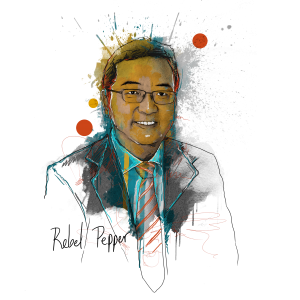 Wang Liming, better known under the pseudonym Rebel Pepper, is one of China’s most notorious political cartoonists. For satirising Chinese Premier Xi Jinping and lampooning the ruling Communist Party, Rebel Pepper has been repeatedly persecuted. In 2014, he was forced to remain in Japan, where he was on holiday, after serious threats against him were posted on government-sanctioned forums. The Chinese state has since disconnected him from his fan base by repeatedly deleting his social media accounts, he alleges his conversations with friends and family are under state surveillance, and self-imposed exile has made him isolated, bringing significant financial struggles. Nonetheless, Rebel Pepper keeps drawing, ferociously criticising the Chinese regime.
Wang Liming, better known under the pseudonym Rebel Pepper, is one of China’s most notorious political cartoonists. For satirising Chinese Premier Xi Jinping and lampooning the ruling Communist Party, Rebel Pepper has been repeatedly persecuted. In 2014, he was forced to remain in Japan, where he was on holiday, after serious threats against him were posted on government-sanctioned forums. The Chinese state has since disconnected him from his fan base by repeatedly deleting his social media accounts, he alleges his conversations with friends and family are under state surveillance, and self-imposed exile has made him isolated, bringing significant financial struggles. Nonetheless, Rebel Pepper keeps drawing, ferociously criticising the Chinese regime.
笔名为“变态辣椒” 的王立铭是一位来自中国大陆的漫画家,以其反共讽刺性漫画而闻名。他因为讥讽习近平以及中国共产党而一而再再而三地受政府迫害。2014年5月,王立铭在旅游日本期间因在中国大陆官媒《人民网》受威胁儿被迫居留日本。中国大陆因想断绝王立铭与其粉丝的关系而删除他社交媒体的账号。他声称与亲戚朋友的交谈总是被监视。他也因为长期独自流亡国外而渐渐地与世隔绝, 陷入经济困境。然而,他并没有放弃以他讽刺性的漫画讥讽共产党。
“Since 2010, I have been adhering to the use of cartoons as a weapon against the Communist Party of China’s totalitarianism. The CPC’s blockade and crackdown on freedom of expression has never ceased. Their persecution against me has not stopped.” — Rebel Pepper[/vc_column_text][/vc_column][/vc_row][vc_row][vc_column][vc_basic_grid post_type=”post” max_items=”12″ style=”load-more” items_per_page=”4″ element_width=”6″ grid_id=”vc_gid:1501084482480-564597df-b0b6-3″ taxonomies=”9021″][awards_fellows years=”2017″][/vc_column][/vc_row]
20 Apr 17 | Awards, Digital Freedom
[vc_row][vc_column][vc_video link=”https://www.youtube.com/watch?v=bc48C8QSOY4″][vc_column_text]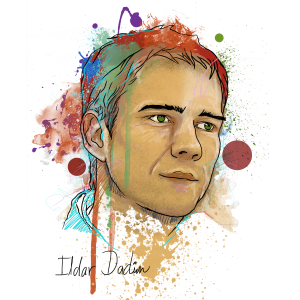 A Russian opposition and LGBT rights activist, Ildar Dadin was the first, and remains the only, person to be convicted under a notorious 2014 public assembly law. Aimed at punishing anyone who breaks strict rules on protest, the law was enacted to silence dissent after a wave of demonstrations following Putin’s last election victory. Dadin’s crime was to stage a series of one-man pickets, often standing silently with a billboard, attempting to duck the cynical law and push for free expression. For his solo enterprise, Dadin was arrested and sentenced to three years imprisonment in December 2015. In November 2016, website Meduza published a letter smuggled from Dadin to his wife, exposing torture he claimed he was suffering alongside fellow prisoners. The letter, a brave move for a serving prisoner, was widely reported. A government investigation was prompted, and Dadin was transferred – against his will – to an undisclosed new location. A wave of public protest led to Dadin’s new location in a Siberian prison colony being revealed in January 2017. In February 2017, Russia’s constitutional and Supreme Courts suddenly quashed Dadin’s conviction, ruling he should be released and afforded opportunity for rehabilitation.
A Russian opposition and LGBT rights activist, Ildar Dadin was the first, and remains the only, person to be convicted under a notorious 2014 public assembly law. Aimed at punishing anyone who breaks strict rules on protest, the law was enacted to silence dissent after a wave of demonstrations following Putin’s last election victory. Dadin’s crime was to stage a series of one-man pickets, often standing silently with a billboard, attempting to duck the cynical law and push for free expression. For his solo enterprise, Dadin was arrested and sentenced to three years imprisonment in December 2015. In November 2016, website Meduza published a letter smuggled from Dadin to his wife, exposing torture he claimed he was suffering alongside fellow prisoners. The letter, a brave move for a serving prisoner, was widely reported. A government investigation was prompted, and Dadin was transferred – against his will – to an undisclosed new location. A wave of public protest led to Dadin’s new location in a Siberian prison colony being revealed in January 2017. In February 2017, Russia’s constitutional and Supreme Courts suddenly quashed Dadin’s conviction, ruling he should be released and afforded opportunity for rehabilitation.
Активист, долгое время защищавший права ЛГБТ и оппозиции, Ильдар Дадин стал первым и единственным в России осужденным по принятой в 2014 году статье «Неоднократное нарушение установленного порядка организации либо проведения собрания, митинга, демонстрации, шествия или пикетирования».
Пытаясь обойти этот закон, Дадин провел серию одиночных пикетов против нарушений прав человека, за что был арестован и в 2015 приговорен к трем годам тюрьмы. В ноябре 2016, интернет-издание «Медуза» опубликовало письмо, которое Дадин передал через свою жену. В нем он рассказал о том, как его пытали, и о повсеместности насилия в российских тюрьмах. Публикация его письма – смелый шаг для отбывающего наказание заключенного – имело широкий общественный резонанс, вызвав реакцию со стороны правительства и став основанием для расследования. Дадина, против его воли, перевели из его колонии, после чего он исчез внутри российской пенитенциарной системы. Его местонахождение было раскрыто лишь в январе 2017 после волны общественных протестов. После того как Верховный суд отменил приговор, Ильдар Дадин вышел на свободу из колонии, 26 февраля.
“Nastya, I ask you to publish this letter because there is a real ‘information blockade’ in this place. (…) I am not afraid of death. Most of all, I am afraid of not being able to withstand the torture and surrendering.” — Ildar Dadin[/vc_column_text][/vc_column][/vc_row][vc_row][vc_column][awards_fellows years=”2017″][vc_basic_grid post_type=”post” max_items=”12″ style=”load-more” items_per_page=”4″ element_width=”6″ grid_id=”vc_gid:1493892409601-d3982799-8efd-3″ taxonomies=”9013″][/vc_column][/vc_row]
20 Apr 17 | Awards
[vc_row][vc_column][vc_video link=”https://www.youtube.com/watch?v=XTqbstpyaFU”][vc_column_text]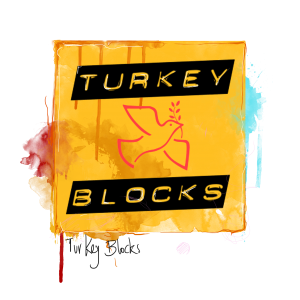 In a country marked by increasing authoritarianism, a strident crackdown on press and social media as well as numerous human rights violations, Turkish-British technologist Alp Toker brought together a small team to investigate internet restrictions. Using Raspberry Pi technology they built an open source tool able to reliably monitor and report both internet shut downs and power blackouts in real time. Using their tool, Turkey Blocks have since broken news of 14 mass-censorship incidents during several politically significant events in 2016. The tool has proved so successful that it has begun to be implemented elsewhere globally.
In a country marked by increasing authoritarianism, a strident crackdown on press and social media as well as numerous human rights violations, Turkish-British technologist Alp Toker brought together a small team to investigate internet restrictions. Using Raspberry Pi technology they built an open source tool able to reliably monitor and report both internet shut downs and power blackouts in real time. Using their tool, Turkey Blocks have since broken news of 14 mass-censorship incidents during several politically significant events in 2016. The tool has proved so successful that it has begun to be implemented elsewhere globally.
“Our alerts, issued within minutes of detection, have helped Turkish citizens to stay online when shutdowns get implemented and provided the media with enough confidence to report assertively on digital censorship in Turkey.” — Alp Toker[/vc_column_text][/vc_column][/vc_row][vc_row][vc_column][awards_fellows years=”2017″][vc_basic_grid post_type=”post” max_items=”12″ style=”load-more” items_per_page=”4″ element_width=”6″ grid_id=”vc_gid:1493136032339-02826cc3-edba-5″ taxonomies=”9034″][/vc_column][/vc_row]
20 Apr 17 | Awards, Digital Freedom
[vc_row][vc_column][vc_video link=”https://www.youtube.com/watch?v=GPhf_u479mI”][vc_column_text]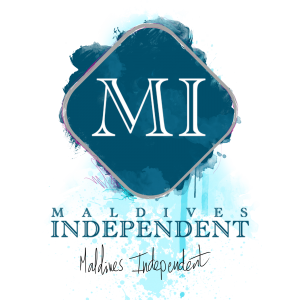 Website Maldives Independent, which provides news in English, is one of the few remaining independent media outlets in a country that ranks 112 out of 180 countries on the Reporters Without Borders Press Freedom Index. In August 2016 the Maldives passed a law criminalising defamation and empowering the state to impose heavy fines and shut down media outlets for “defamatory” content. In September, Maldives Independent’s office was violently attacked and later raided by the police, after the release of an Al Jazeera documentary exposing government corruption that contained interviews with editor Zaheena Rasheed, who had to flee for her safety. Despite the pressure, the outlet continues to hold the government to account.
Website Maldives Independent, which provides news in English, is one of the few remaining independent media outlets in a country that ranks 112 out of 180 countries on the Reporters Without Borders Press Freedom Index. In August 2016 the Maldives passed a law criminalising defamation and empowering the state to impose heavy fines and shut down media outlets for “defamatory” content. In September, Maldives Independent’s office was violently attacked and later raided by the police, after the release of an Al Jazeera documentary exposing government corruption that contained interviews with editor Zaheena Rasheed, who had to flee for her safety. Despite the pressure, the outlet continues to hold the government to account.
“Journalists in the Maldives have taken unprecedented risks in reporting on human rights, business corruption and abuse of authority. I believe a free press is crucial, essential in protecting human rights.” — Zaheena Rasheed[/vc_column_text][/vc_column][/vc_row][vc_row][vc_column][awards_fellows years=”2017″][vc_basic_grid post_type=”post” max_items=”12″ style=”load-more” items_per_page=”4″ element_width=”6″ grid_id=”vc_gid:1493892692381-e3adb733-ce94-6″ taxonomies=”9028″][/vc_column][/vc_row]
20 Apr 17 | Digital Freedom, Press Releases
A Chinese political cartoonist forced into exile and a Russian prisoners and LGBT rights activist convicted under the country’s draconian anti-protest law were among the winners of the 2017 Index on Censorship Freedom of Expression Awards.
The winners, announced on Wednesday evening at a gala ceremony in London, also included a crusading news organisation battling corruption in the Maldives and a group tracking Turkey’s internet shutdowns.

From left: Cartoonist Martin Rowson accepting the Arts Award on behalf of Chinese cartoonist Rebel Pepper; Alp Toker of Digital Activism Award-winner Turkey Blocks; Isik Mater of Digital Activism Award-winner Turkey Blocks; Anastasia Zotova, wife and campaign partner of Campaigning Award-winner Ildar Dadin; Ahemd Naish, editor of Journalism Award-winning Maldives Independent; Zaheena Rasheed, former editor of Journalism Award-winning Maldives Independent. (Photo: Elina Kansikas for Index on Censorship)
Awards were presented in four categories: arts, campaigning, digital activism and journalism.
The winners were: Chinese political cartoonist Rebel Pepper (Arts); Russian human rights activist Ildar Dadin (Campaigning); Digital collective Turkey Blocks (Digital Activism); news outlet Maldives Independent and its former editor Zaheena Rasheed (Journalism).
“These winners are free speech heroes who deserve global recognition,” said Index on Censorship CEO Jodie Ginsberg. “They, like all of those nominated, face huge personal and political hurdles in their fight so that others can express themselves freely.”
Drawn from more than 400 public nominations, the winners were presented with their awards at a ceremony at the Unicorn Theatre, London, hosted by comedian Katy Brand.
Actors, writers and musicians were among those celebrating with the winners. The guest list included activist Bianca Jagger, artist Bob and Roberta Smith, tech expert Nicole Yershon journalists Matthew Parris and David Aaronovitch, lawyer Nancy Hollander, novelist Hilary Mantel and director Peter Kosminsky.
Winners were presented with cartoons created by Aseem Trivedi, an Indian political cartoonist and activist, known for his Cartoons Against Corruption campaign.

High-res versions of the awards cartoons can be found here.
Neither Rebel Pepper nor Ildar Dadin could join the ceremony in London. Dadin was represented by his wife and campaigning partner Anastasia Zotova. Rebel Pepper delivered his acceptance speech via video.
Each of the award winners becomes part of the third cohort of Freedom of Expression Awards fellows. They join last year’s winners — Zaina Erhaim (Journalism), Bolo Bhi (Campaigning), GreatFire (Digital Activism), Murad Subay (Arts), Smockey (Music in Exile) — as part of a world-class network of campaigners, activists and artists sharing best practices on tackling censorship threats internationally.
Through the fellowship, Index works with the winners – both during an intensive week in London and the rest of the awarding year – to provide longer term, structured support. The goal is to help winners maximise their impact, broaden their support and ensure they can continue to excel at fighting free expression threats on the ground.
Judges included Harry Potter actor Noma Dumezweni, Hillsborough lawyer Caoilfhionn Gallagher QC, former Vanity Fair editor Tina Brown, as well as Anab Jain, TED fellow and co-founder of Superflux, and Stephen Budd, chairman of the Music Managers Forum.
Awards judge Tina Brown said: “At a time when freedom of expression and press are facing continuous and unprecedented threats around the globe, I am more than ever inspired by the boundless courage and sacrifices of Rebel Pepper, Ildar Dadin, Maldives Independent and Turkey Blocks. Ridiculed, persecuted, imprisoned, tortured, banned or exiled, these writers and activists are putting their lives on the line every day in order to protect basic human rights and fight injustice everywhere.”
Ziyad Marar, president of global publishing of SAGE Publishing, said: “Through working with Index for many years both as publisher of the magazine and sponsors of the awards ceremony, we at Sage are proud to support a truly outstanding organisation as they defend free expression around the world. Our warmest congratulations to everyone recognised tonight for their achievements and the inspiring example they set for us all.”
This is the 17th year of the Freedom of Expression Awards. Former winners include activist Malala Yousafzai, cartoonist Ali Ferzat, journalists Anna Politkovskaya and Fergal Keane, and Bahrain Center for Human Rights.
Guests were treated to food provided by Ganapati Restaurant and beer created by craft brewery Flying Dog.
Further details about the award winners are below.
For interviews with the award winners, who are in London until Friday 21 April, please contact David Heinemann at davidh@indexoncensorship.org.
Videos, photographs and other content related to the awards night will be available beginning 11am on Thursday 20 April. Please contact Sean Gallagher at sean@indexoncensorship.org.
Index on Censorship is grateful for the support of the 2017 Freedom of Expression Awards sponsors: SAGE Publishing, Google, Private Internet Access, CNN, Vodafone, Vice News, Doughty Street Chambers, former Index Award-winning Psiphon, Gorkana, Edwardian Hotels and Flying Dog Brewery. Additional consideration provided by PROPERCORN and Divine Chocolate.
—–
Index on Censorship Freedom of Expression Awards 2017 – background on winners
Arts – Rebel Pepper (China)
Cartoonist Wang Liming (aka Rebel Pepper) was presented with the Index 2017 Freedom of Expression Award Arts award for satirising Chinese Premier Xi Jinping and lampooning the ruling Communist Party. For his efforts Rebel Pepper has been repeatedly persecuted. In 2014, he took exile in Japan after serious threats against him were posted on Chinese government-sanctioned online forums. The Chinese state has since disconnected him from his fan base by repeatedly deleting his social media accounts, conversations with friends and family are under state surveillance, and exile has made him isolated, bringing significant financial struggles. Nonetheless, Rebel Pepper keeps drawing, ferociously criticising the Chinese regime.
Journalist and 2017 Freedom of Expression Award judge Tina Brown said: “Rebel Pepper was cut off from his family, cut off from all his friends and he wasn’t even able to go back for his mother’s funeral after she died from cancer, which is a very, very cruel fate for someone who simply wanted to tell the truth. At a time when the president of China is going off to Davos and making big statesmen-like speeches about how China is a big open society now, everybody come and trade, the fact is that it’s a really repressive and dark regime.”
In his acceptance speech, delivered by video, Wang Liming said: “Political cartoons are significant as I can use my works to peel away the mask of false perfection put on by the Chinese government. The humour and satire employed in my works can also help lighten the mood and dispel the fear that the Chinese people have towards the administration. I feel that these are the key reasons why political cartoons play such an important role in China. Ever since I came to Japan, I have been able to relish freedom of speech to the fullest. As such, my works are no longer limited by any external restrictions save for the boundaries of my own imagination.”
Speech | Profile
Campaigning – Ildar Dadin (Russia). Award supported by Doughty Street Chambers
A Russian prisoners and LGBT rights activist, Dadin was the first, and only, person to be convicted under a notorious 2014 public assembly law. Aimed at punishing anyone who breaks strict rules on protest, the law was enacted to silence dissent after a wave of demonstrations following President Vladimir Putin’s last election victory. Dadin’s crime was to stage a series of one-man pickets, often standing silently with a billboard, attempting to duck the cynical law and push for free expression. For his solo enterprise, Dadin was arrested and sentenced to three years imprisonment in December 2015. In November 2016, website Meduza published a letter smuggled from Dadin to his wife, exposing torture he suffered alongside fellow prisoners. In February 2017, a Russian court quashed his conviction and Dadin was released.
Barrister and 2017 Freedom of Expression Awards judge Caoilfhionn Gallagher QC said: “Ildar Dadin has stood up to the Russian authorities in circumstances where we know how risky that can be: It has cost individuals their lives in recent years. It can even lose you a presidential election, as we now know. But Ildar, despite that, has continued to speak out and he continues to speak out even in the worst of circumstances.”
Speaking on behalf of Ildar Dadin, his wife and campaigning partner Anastasia Zotova said: “Tonight I tell you, that in Russia, there are no human rights. It is a society ruled through levels of cruelty and bigotry where Russians are forced to worship the great leader and any and all dissidents are stoned. Maybe I cannot join you in London but I can refuse to be silent. And you, friends, can refuse to be silent too. You can refuse to let these people silence me. Together, we can refuse to look away.”
Speech | Profile
Digital Campaigning – Turkey Blocks (Turkey). Award sponsored by Private Internet Access
Turkey Blocks is a digital transparency project documenting internet blackouts in a country marked by increasing authoritarianism, a strident crackdown on press and social media and numerous human rights violations.Turkish-British technologist Alp Toker brought together a small team to investigate internet restrictions and using Raspberry Pi technology they built an open source tool able to reliably monitor and report both internet shut downs and power blackouts in real time. Using their tool, Turkey Blocks have since broken news of 14 mass-censorship incidents during several politically significant events in 2016. The tool has proved so successful that it has been implemented elsewhere globally.
Designer and 2017 Freedom of Expression Awards judge Anab Jain said: “Alp Toker and Turkey Block’s work is important because it is going to have impact not just in Turkey but across the world wherever we start to see internet shutdowns.”
Alp Toker, founder of Turkey Blocks, said: “Turkey Blocks has developed new technology that can pinpoint and validate reports of shutdowns in real time. Through 2016 we uncovered evidence of over a dozen major blackouts during national emergencies, arrests of opposition party members and a devastating attempted military coup. We provided the data that enabled media, local press and international communities to report with confidence and push back to keep the internet on. We encouraged the government to become more transparent and limit use of their telecommunications kill-switch. Today our cause crosses political lines and resounds throughout Turkey’s polarised society.”
Speech | Profile
Journalism – Maldives Independent and Zaheena Rasheed (Maldives). Award sponsored by CNN
Website Maldives Independent, which provides news in English, is one of the few remaining independent media outlets in a country that ranks 112 out of 180 countries on the Reporters Without Borders Press Freedom Index. In August 2016 the Maldives passed a law criminalising defamation and empowering the state to impose heavy fines and shut down media outlets for “defamatory” content. In September, Maldives Independent’s office was violently attacked and later raided by the police, after the release of an Al Jazeera documentary exposing government corruption that contained interviews with former editor Zaheena Rasheed, who had to flee for her safety. Despite the pressure, the outlet continues to hold the government to account.
Doughty Street Chambers Barrister and 2017 Freedom of Expression Awards judge Caoilfhionn Gallagher QC said: “Maldives Independent under the stewardship of Zaheena Rasheed has faced attacks from all sides in recent years and despite all that they’ve continued to do what they do best: tell stories, expose corruption, expose human rights abuses and attacks on a free press.”
Zaheena Rasheed, former editor, Maldives Independent said: “This award feels like a lifeline. Most of our challenges remain the same, but this recognition and the fellowship has renewed and strengthened our resolve to continue reporting, especially on the bleakest of days. Most importantly, we no longer feel so alone. Tonight I want to honour my colleague, Ahmed Rilwan – who embodies the spirit of speaking truth to power, even in the face of the gravest threats. He’s been missing for nearly 1,000 days now. I want to say tonight, that no matter how long it may take, we will continue the search for him and fight for him.”
Speech | Profile
ABOUT THE FREEDOM OF EXPRESSION AWARDS AND FELLOWSHIP
The Index on Censorship Freedom of Expression Awards recognise those individuals and groups making the greatest impact in tackling censorship worldwide. Established 17 years ago, the awards shine a light on work being undertaken in defence of free expression globally. Often these stories go unnoticed or are ignored by the mainstream press. Through the fellowship, Index works with the winners – both during an intensive week in London and the rest of the awarding year – to provide longer term, structured support. The goal is to help winners maximise their impact, broaden their support and ensure they can continue to excel at fighting free expression threats on the ground.
ABOUT INDEX ON CENSORSHIP
Index on Censorship is a UK-based nonprofit that campaigns against censorship and promotes free expression worldwide. Founded in 1972, Index has published some of the world’s leading writers and artists in its award-winning quarterly magazine, including Nadine Gordimer, Mario Vargas Llosa, Samuel Beckett and Kurt Vonnegut. Index promotes debate, monitors threats to free speech and supports individuals through its annual awards and fellowship program.
20 Apr 17 | Index in the Press
Pro-Israel activists picketed an award ceremony in London last night over the nomination of Breaking the Silence, an Israeli veterans’ group which collects testimonies about alleged human rights abuses. The campaign group Index on Censorship had shortlisted Breaking the Silence for its Freedom of Expression award, which “honours courageous champions who fight for free speech around the world”. Read the full article







 Wang Liming, better known under the pseudonym Rebel Pepper, is one of China’s most notorious political cartoonists. For satirising Chinese Premier Xi Jinping and lampooning the ruling Communist Party, Rebel Pepper has been repeatedly persecuted. In 2014, he was forced to remain in Japan, where he was on holiday, after serious threats against him were posted on government-sanctioned forums. The Chinese state has since disconnected him from his fan base by repeatedly deleting his social media accounts, he alleges his conversations with friends and family are under state surveillance, and self-imposed exile has made him isolated, bringing significant financial struggles. Nonetheless, Rebel Pepper keeps drawing, ferociously criticising the Chinese regime.
Wang Liming, better known under the pseudonym Rebel Pepper, is one of China’s most notorious political cartoonists. For satirising Chinese Premier Xi Jinping and lampooning the ruling Communist Party, Rebel Pepper has been repeatedly persecuted. In 2014, he was forced to remain in Japan, where he was on holiday, after serious threats against him were posted on government-sanctioned forums. The Chinese state has since disconnected him from his fan base by repeatedly deleting his social media accounts, he alleges his conversations with friends and family are under state surveillance, and self-imposed exile has made him isolated, bringing significant financial struggles. Nonetheless, Rebel Pepper keeps drawing, ferociously criticising the Chinese regime. A Russian opposition and LGBT rights activist, Ildar Dadin was the first, and remains the only, person to be convicted under a notorious 2014 public assembly law. Aimed at punishing anyone who breaks strict rules on protest, the law was enacted to silence dissent after a wave of demonstrations following Putin’s last election victory. Dadin’s crime was to stage a series of one-man pickets, often standing silently with a billboard, attempting to duck the cynical law and push for free expression. For his solo enterprise, Dadin was arrested and sentenced to three years imprisonment in December 2015. In November 2016, website Meduza published a letter smuggled from Dadin to his wife, exposing torture he claimed he was suffering alongside fellow prisoners. The letter, a brave move for a serving prisoner, was widely reported. A government investigation was prompted, and Dadin was transferred – against his will – to an undisclosed new location. A wave of public protest led to Dadin’s new location in a Siberian prison colony being revealed in January 2017. In February 2017, Russia’s constitutional and Supreme Courts suddenly quashed Dadin’s conviction, ruling he should be released and afforded opportunity for rehabilitation.
A Russian opposition and LGBT rights activist, Ildar Dadin was the first, and remains the only, person to be convicted under a notorious 2014 public assembly law. Aimed at punishing anyone who breaks strict rules on protest, the law was enacted to silence dissent after a wave of demonstrations following Putin’s last election victory. Dadin’s crime was to stage a series of one-man pickets, often standing silently with a billboard, attempting to duck the cynical law and push for free expression. For his solo enterprise, Dadin was arrested and sentenced to three years imprisonment in December 2015. In November 2016, website Meduza published a letter smuggled from Dadin to his wife, exposing torture he claimed he was suffering alongside fellow prisoners. The letter, a brave move for a serving prisoner, was widely reported. A government investigation was prompted, and Dadin was transferred – against his will – to an undisclosed new location. A wave of public protest led to Dadin’s new location in a Siberian prison colony being revealed in January 2017. In February 2017, Russia’s constitutional and Supreme Courts suddenly quashed Dadin’s conviction, ruling he should be released and afforded opportunity for rehabilitation. In a country marked by increasing authoritarianism, a strident crackdown on press and social media as well as numerous human rights violations, Turkish-British technologist Alp Toker brought together a small team to investigate internet restrictions. Using Raspberry Pi technology they built an open source tool able to reliably monitor and report both internet shut downs and power blackouts in real time. Using their tool, Turkey Blocks have since broken news of 14 mass-censorship incidents during several politically significant events in 2016. The tool has proved so successful that it has begun to be implemented elsewhere globally.
In a country marked by increasing authoritarianism, a strident crackdown on press and social media as well as numerous human rights violations, Turkish-British technologist Alp Toker brought together a small team to investigate internet restrictions. Using Raspberry Pi technology they built an open source tool able to reliably monitor and report both internet shut downs and power blackouts in real time. Using their tool, Turkey Blocks have since broken news of 14 mass-censorship incidents during several politically significant events in 2016. The tool has proved so successful that it has begun to be implemented elsewhere globally. Website Maldives Independent, which provides news in English, is one of the few remaining independent media outlets in a country that ranks 112 out of 180 countries on the Reporters Without Borders Press Freedom Index. In August 2016 the Maldives passed a law criminalising defamation and empowering the state to impose heavy fines and shut down media outlets for “defamatory” content. In September, Maldives Independent’s office was violently attacked and later raided by the police, after the release of an Al Jazeera documentary exposing government corruption that contained interviews with editor Zaheena Rasheed, who had to flee for her safety. Despite the pressure, the outlet continues to hold the government to account.
Website Maldives Independent, which provides news in English, is one of the few remaining independent media outlets in a country that ranks 112 out of 180 countries on the Reporters Without Borders Press Freedom Index. In August 2016 the Maldives passed a law criminalising defamation and empowering the state to impose heavy fines and shut down media outlets for “defamatory” content. In September, Maldives Independent’s office was violently attacked and later raided by the police, after the release of an Al Jazeera documentary exposing government corruption that contained interviews with editor Zaheena Rasheed, who had to flee for her safety. Despite the pressure, the outlet continues to hold the government to account.
